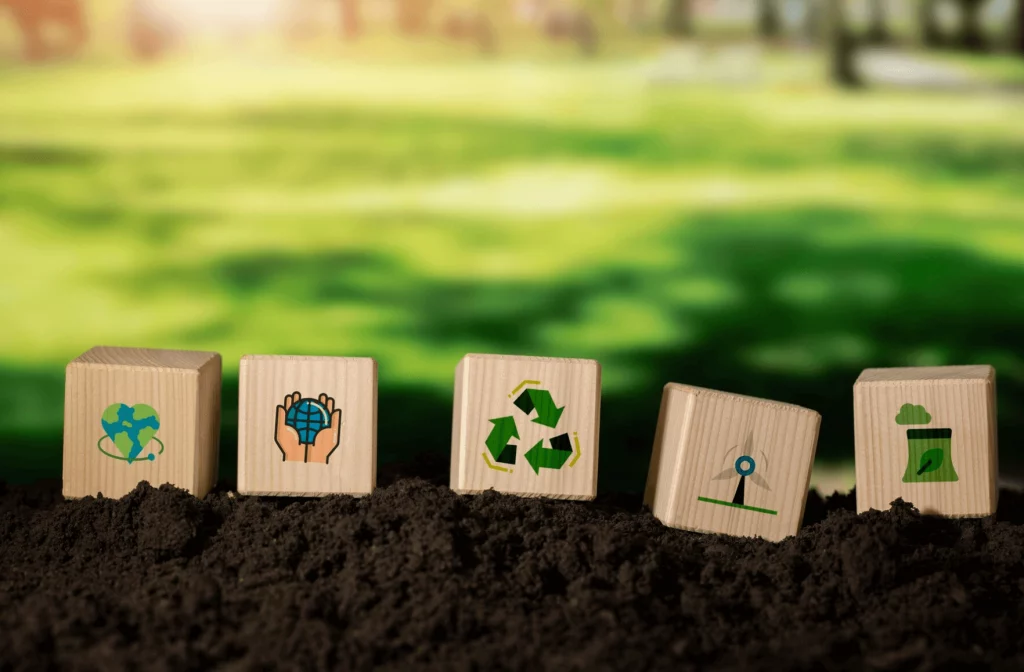Biowaste management in 2024: how to implement it ?

As of January 1st, source sorting becomes mandatory for all businesses in France. To be compliant, it’s important to implement your biowaste treatment.
- Step 1: Understanding biowaste treatment
- Step 2: Necessary adjustments
- Step 3: What are the different possible treatments for biowaste?
- Step 4 of biowaste treatment: Implementation
- Assistance for biowaste treatment
- How to reduce biowaste production?
Step 1: Understanding biowaste treatment
Why treat biowaste?
Beyond regulations, biowaste treatment is an essential necessity for any company concerned about its environmental impact and social responsibility. Proper management of these organic wastes offers several significant advantages for your business.
- Reducing carbon footprint
Treating biowaste helps reduce your company’s carbon footprint. By opting for appropriate treatment methods, you avoid anaerobic decomposition of waste, which generates methane, a greenhouse gas more potent than carbon dioxide. You actively participate in combating climate change.
- Compliance with environmental standards
Biowaste treatment is not only an ecological approach but also a legal obligation. By adhering to current environmental standards, your company avoids potential sanctions and enhances its reputation as an environmentally responsible actor.
- Valorization of organic waste
Treating biowaste offers the opportunity to valorize it rather than considering it as simple waste. Composting, methanization, or other techniques can transform these wastes into valuable resources such as organic compost or biogas. This promotes a circular economy and contributes to the preservation of natural resources.
- Optimization of waste management costs
Biowaste treatment can also result in economic benefits for your company. By reducing the amount of waste destined for landfilling or incineration, you minimize the costs associated with waste disposal. Furthermore, valorizing organic waste can generate long-term savings.
- Involvement in sustainable practices
By treating your biowaste, your company engages in sustainable practices that go beyond legal obligations. This strengthens your brand image by demonstrating your environmental responsibility and active contribution to planet preservation. Consumers and business partners increasingly appreciate companies committed to sustainable practices.

Different types of biowaste
- Food waste
Food waste represents a significant portion of the biowaste generated by businesses. This includes meal leftovers, peelings, and expired food. Proper treatment of these organic wastes not only reduces your company’s carbon footprint but also produces beneficial natural fertilizers for the environment.
- Green waste
Green waste includes residues from lawn mowing, tree and plant pruning, as well as gardening debris. Opting for appropriate treatment of these organic wastes allows them to be valorized into compost, thus promoting resource circularity.
- Biodegradable waste
Biodegradable waste includes a variety of organic materials such as untreated papers, natural fiber textiles, and wood waste. Responsible management involves environmentally friendly treatment methods, thus contributing to the preservation of natural resources.
- Kitchen waste
Kitchen waste includes leftovers of fruits, vegetables, and other organic products used in meal preparation. Effective sorting and appropriate treatment of this waste contribute to the overall waste reduction of the company while creating opportunities for more sustainable practices.
Step 2: Necessary adjustments
Your role is to ensure that the biowaste you produce is separated from other waste. To ensure:
- collection
- treatment
- waste valorization
We advise you to contact your usual waste management providers or to seek assistance from a biowaste collection specialist.
Optimize your waste recycling routes with our solution!
Step 3: What are the different possible treatments for biowaste?
Composting
Composting is one of the most effective methods for treating biowaste within your company. This approach involves naturally decomposing organic waste into a nutrient-rich fertilizer. If properly managed, the process offers a sustainable solution while reducing the amount of waste destined for disposal. Integrating a composting system can not only promote your company’s sustainability but also constitute an engaging environmental initiative.
Separate collection
By encouraging effective separation at the source, your company facilitates the overall biowaste management process. Implement clear sorting systems, raise awareness among your employees, and ensure the availability of dedicated containers. Well-organized separate collection is key to maximizing the environmental benefits of biowaste treatment.
Opting for these biowaste treatment approaches within your company is not only an environmental choice but also an investment in sustainability and social responsibility. These practices not only reduce your ecological impact but also demonstrate your company’s commitment to environmentally friendly practices.

Step 4 of biowaste treatment: Implementation
Composting
Composting emerges as an ecological and efficient solution for biowaste treatment. By integrating composting bins into your premises, you transform organic waste into a natural soil amendment, thereby reducing your environmental impact.
Separate collection
Separate collection of biowaste is a fundamental step. Encourage waste separation at the source by providing separate bins and raising awareness among staff. This practice simplifies the treatment process, optimizes the valorization of organic waste, and contributes to your commitment to sustainable resource management.
Assistance for biowaste treatment
The French government offers a range of financial assistance to local authorities and economic actors for biowaste treatment. These aids are granted by the French Environment and Energy Management Agency (ADEME).
Aids may cover part of the following expenses:
- preliminary studies
- collection equipment
- treatment equipment
- communication and awareness-raising
To benefit from biowaste treatment assistance, it is necessary to submit an application to ADEME. The application must include the following information:
- type of aid requested
- envisaged expenses
- schedule of works
The application can be downloaded from the ADEME website.
How to reduce biowaste production?
As a business owner, optimizing biowaste management is an ecological and economic imperative. Here are practical tips to effectively reduce biowaste production within your company.
- Staff awareness and training
Start by raising awareness among your team about the importance of reducing biowaste. Organize training sessions to explain sorting best practices and the positive consequences of this approach.
- Audit of internal processes
Conduct a thorough audit of your internal processes to identify the main sources of biowaste. This will enable you to target areas requiring adjustments to minimize organic waste production.
- Regular progress monitoring
Establish regular monitoring of progress in biowaste reduction. This will allow you to adjust strategies based on results and maintain team engagement over time.
Nomadia is your partner to accompany you in this transition and help you reduce your carbon footprint.
